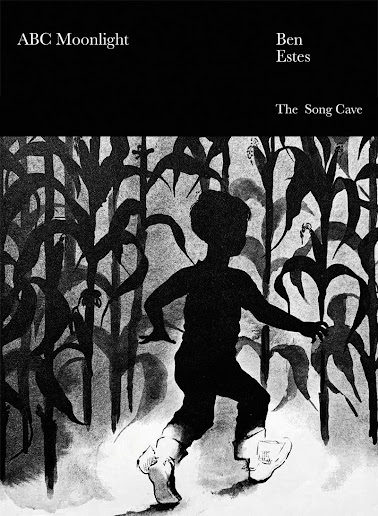With empathy as the
cornerstone
of good design, let’s
look there for meaning,
down into this sloping
bowl of a field
funneling into my
rainbow-painted tunnel.
Where was the nuance? (“Twelve Folded Poems”)
The latest from Kingston, New York poet, editor and publisher Ben Estes is ABC Moonlight (Kingston NY: The Song Cave, 2022), following the chapbooks Lamp like l’map (2009), Cymbals (2010), The Strings of Walnetto Arrangements (2011), and 8 Poems (2012) as well as his full-length debut, Illustrated Games of Patience (The Song Cave, 2015) [see where I mentioned such here]. Set in three sections—“Twelve Folded Poems,” “Sixteen Pickup Pocket Quarry” and “A Shadow Theater”—the collection opens with an alternating sequence of poems numbered “1” and “2,” flipping back and forth across twenty-four individual poems set in pairs. “There wasn’t yet a sun.” the third poem (and the second poem titled “1”) in the sequence offers, “The sky was still empty. // The man who did this job / before me could stand so quietly. // He could make a whistle from the seed of any fruit. / Once he made a kite out of newspaper // and he told stories about the stars, and about the earth. / He told them to pass the night, // and because his heart was a reflection / in the soul of the world.” The poems offer a binary that evades easy narrative, turning in on itself even as it progresses. And yet, Estes’ poems, both in this particular sequence and throughout the collection, display a cadence of ease even across longing and heartbreak, through repetition and rhythm, almost held as a metronome tic of accumulation and pinpoint accuracy. Or, as the opening poem to the opening sequence reads, in full:
Dear Nature,
did love make me?
Estes’ accumulations shape and form narrative out of a sequence of pinpoints, reminiscent (in form, at least) to the work of Philadelphia poet ryan eckes, or even across the work of the late American poet Robert Creeley: one phrase following and threading immediately after and upon another. As Estes writes near the end of the second section/sequence: “with you this life who // as a kid thought // could be ours you & me // in the world riding alongside // everything but all of it up broken // in my life I could never // admit equal to everything // I had taken or been given ever since [.]” Estes manages subtle moments and phrases, some of which rattle, others that sink deep in the skin. In many ways, this is a book-length tryptich on longing and heartbreak, loss and recollection, attempting to clarify and document the threads of how one gets from there to here, composing long stretches of narrative across what might be described as a thousand individual accumulated and finely-hewn points. “before your things,” he writes, “were gone i guess // you had too much // else to say in order // to say goodbye [.]”



No comments:
Post a Comment